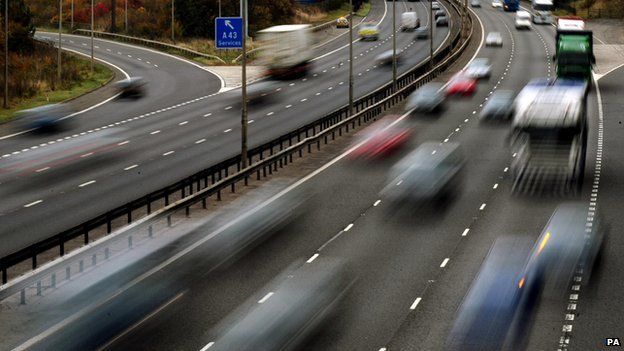Drug-drive changes and "drugalysers" come into force
- Published
- comments

New regulations aimed at stopping people driving while on drugs have come into force in England and Wales.
Drivers face prosecution if they exceed limits set for the presence of eight illegal drugs, including cannabis and cocaine, and eight prescription drugs.
Police will be able to use "drugalyser" devices at the roadside.
Campaigners welcomed the move and ministers said it would save lives, but a motoring lawyer said the impact on prescription drug users was a concern.
Meanwhile, Greater Manchester Police says it will delay implementing the new rules for about two weeks as it needs more time to train its officers and examine the legal implications of the changes.
The new rules run alongside the existing law, under which it is an offence to drive when impaired by any drug.
The existing penalties mean drug drivers already face a fine up to £5,000, up to six months in prison and a minimum one-year driving ban.
'Devastates families'
The new regulations set low levels for the eight illegal drugs, with higher levels set for eight prescription drugs, including morphine and methadone.
Those using prescription drugs within recommended amounts will not be penalised.
Police will be able to use "drugalysers" to screen for cannabis and cocaine at the roadside.
Officers will also be able to test for these and other drugs including ecstasy, LSD, ketamine and heroin at a police station, even if a driver passes the roadside check.
New devices that can test for a greater number of drugs at the roadside will be developed in the future.
Lillian Groves was killed by a driver who admitted he was high on drugs
David Taylor, professor of psychopharmacology at Kings College, London and a member of the Department of Transport's advisory panel on drug driving, said the rules would work as a much stronger deterrent and make prosecutions much easier.
Speaking on Radio 4's Today programme he said: "It's a zero-tolerance approach."
He said any exposure would render people over the limit and would leave them over the limit for up to 36 hours.
The situation for people who use prescription drugs had not changed, he said, but "the onus is on the individual to assure themselves that their driving ability is not impaired".
He recommended that drivers who take prescription drugs carry proof so they could produce it at the roadside if needed.
Prescription drugs covered by the new law
- Clonazepam is prescribed to treat seizures or panic disorders
- Diazepam is used for anxiety disorders, alcohol withdrawal symptoms or muscle spasms
- Flunitrazepam (also known as Rohypnol) is a sedative originally used in hospitals for deep sedation in the 1970s
- Lorazepam is used to treat convulsions or seizures caused by epilepsy
- Oxazepam is used to relieve anxiety, including anxiety caused by alcohol withdrawal
- Temazepam affects chemicals in the brain that may become unbalanced and cause insomnia problems
- Methadone is used in the treatment of heroin addiction and for pain relief
- Morphine or opiates treat moderate to severe pain
The changes have been welcomed by the campaigning mother of 14-year-old girl who was killed by a speeding driver who had smoked cannabis.
Lillian Groves died outside her home in New Addington, in Croydon, south London, in June 2010. The driver of the vehicle involved later received an eight-month jail sentence.
"We have fought tirelessly since losing Lillian, and our determination has brought about this significant change," said Lillian's mother, Natasha Groves.
She told the Today programme the problems with drug driving were much bigger than people realised "because they have been able to get away with it for so long".
A government road safety THINK! campaign has also been launched to coincide with the new legislation.
'Done nothing wrong'
Sarah Sillars, chief executive of the Institute of Advanced Motorists, said the law was "a real step in the right direction".
Greater Manchester Police Chief Inspector Mark Dexter said the force would delay use of the legislation until it was satisfied "the legal and procedural issues involved in prosecuting these cases can properly withstand legal scrutiny".
"This will be a temporary delay whilst we ensure our equipment has the right certification and our officers have the right training and understand the required procedures."
Damien Simmonds, a lawyer at JMW solicitors in Manchester, suggested the change could create legal "complications".
He said many users of prescription drugs who "feel they have done nothing wrong" could be prosecuted for failing to provide roadside samples to police.
"There's a lot of people driving on levels they feel comfortable with, that they've been prescribed," he told BBC Radio Manchester.
- Published1 March 2015
- Published27 February 2015
- Published10 February 2015